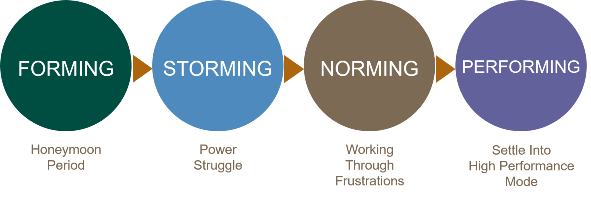
When a team is first put together, there is often a lot of energy, excitement, and optimism. However, newly-created teams don’t automatically achieve success. They require a lot of hard work before they function successfully as a unit. It is unrealistic to believe that a newly-created team will create solid relationships, find its focus, and instantly reach peak performance without any external input. Without the right level of guidance and support, it’s not unusual for team members to ask themselves questions such as, “Is this going to waste my time,” “Will this be worth it,” “What is my role,” and “Am I going to be able to make a meaningful contribution to this group?”
Without solid leadership, this type of uncertainty can stand in the way of a team’s ability to thrive.
So, when you are faced with the need to create a new team, it’s helpful to be aware of the lifecycle that teams tend to follow throughout their evolution, as first documented by psychologist Bruce Tuckman more than 50 years ago.
This lifecycle has four distinct stages.

Stage One - Forming: The team is selected, a leader is identified, and work commences. In this stage, people are feeling their way, getting to know each other, and coming to grips with the task at hand. At the beginning everyone is well behaved because this is the honeymoon period. True feelings tend to be hidden and enthusiasm generally tempers any frustrations at this early stage.
Stage Two - Storming: Polite behavior can erupt into anger if competing leaders are grappling for power. Cliques and factions form and there may be power struggles. The team may struggle to survive, attendance can become an issue, and team performance drops. The team needs to focus on its goals to avoid becoming distracted by relationship and emotional issues. Compromises are required in order for progress to be made.
Stage Three – Norming: Team members reach agreement and consensus, facilitated by their leader. Roles and responsibilities are now clear and accepted. Major decisions are made as a group, while commitment and unity become stronger. The team may even participate together in social activities. There is general respect for the leader, who shares some aspects of leadership with the team. Everyone continues to work and grow together, controlling their emotions and working through frustrations.
Stage Four - Performing: The team is now aware of the strategic focus and knows clearly what it is doing and why. It has a shared vision and is able to stand on its own feet. There is a focus on exceeding expectations with a high degree of autonomy. While disagreements may still occur, they are resolved within the team positively and any required changes to processes and structure are made. The team is able to work toward achieving its goals and team members look after each other. The leader still needs to delegate tasks and projects, but team members do not need to be instructed or assisted with most activities.
As you can see from this evolution, selecting the right mix of team members and a strong team leader are critical to your success when creating a new team. By investing time up front to think carefully about what you are trying to accomplish and working to get the team structure right from the start, you can save a lot of time and energy over the long-term.
A final thought: Try not to worry when the team enters the storming phase. This level of conflict is normal. Don’t take it personally and embrace change.
Robert S. Olszewski can be reached at Email or 215.441.4600.
You may also like:


